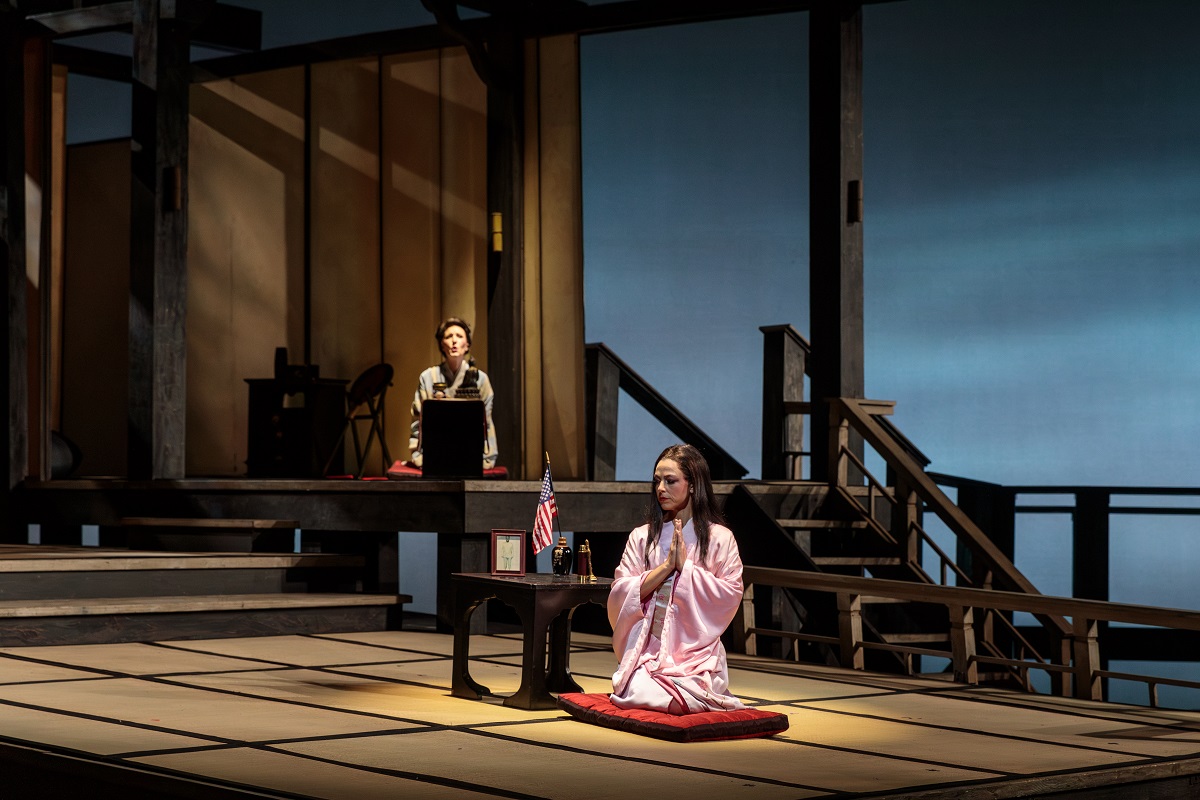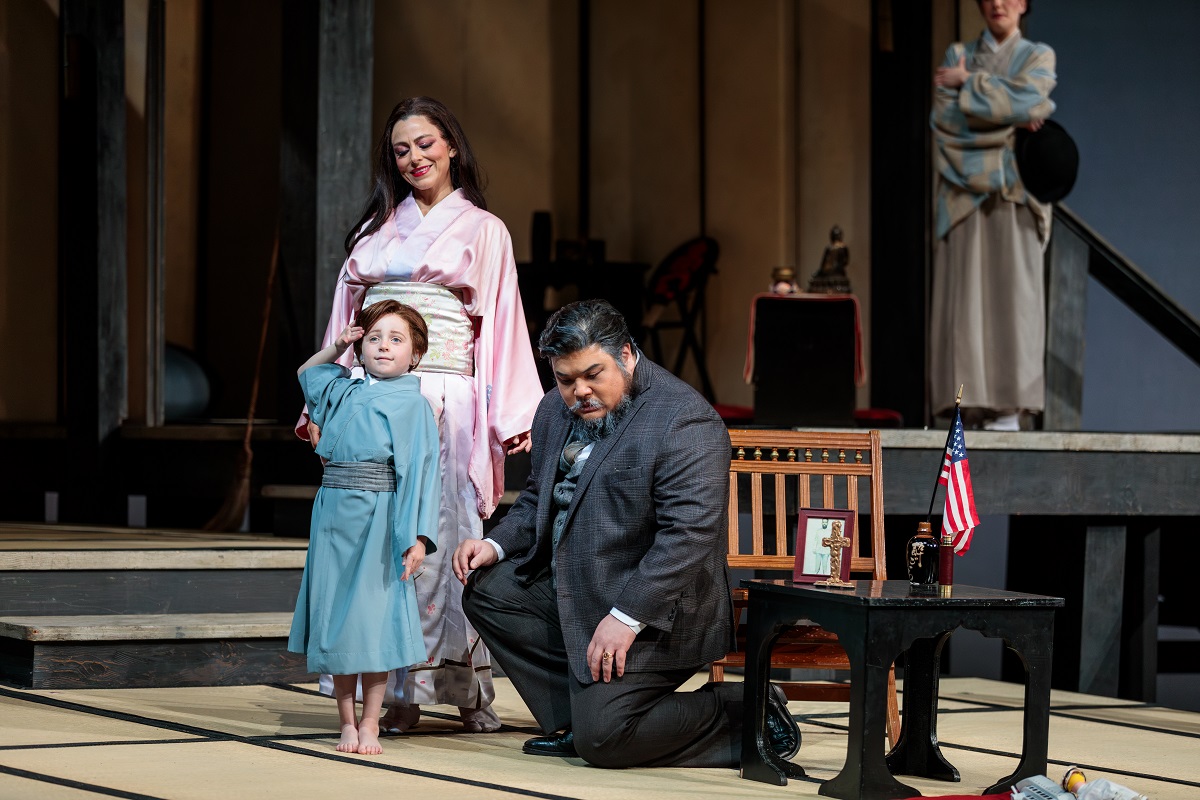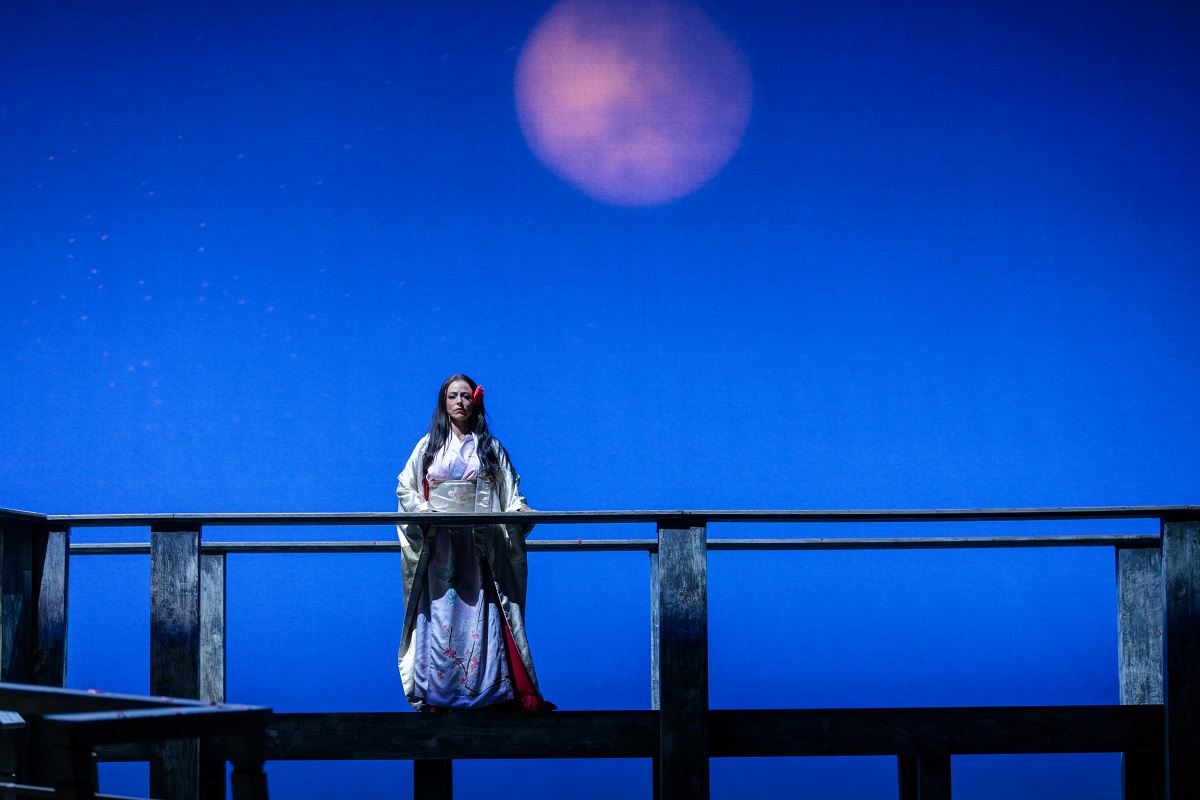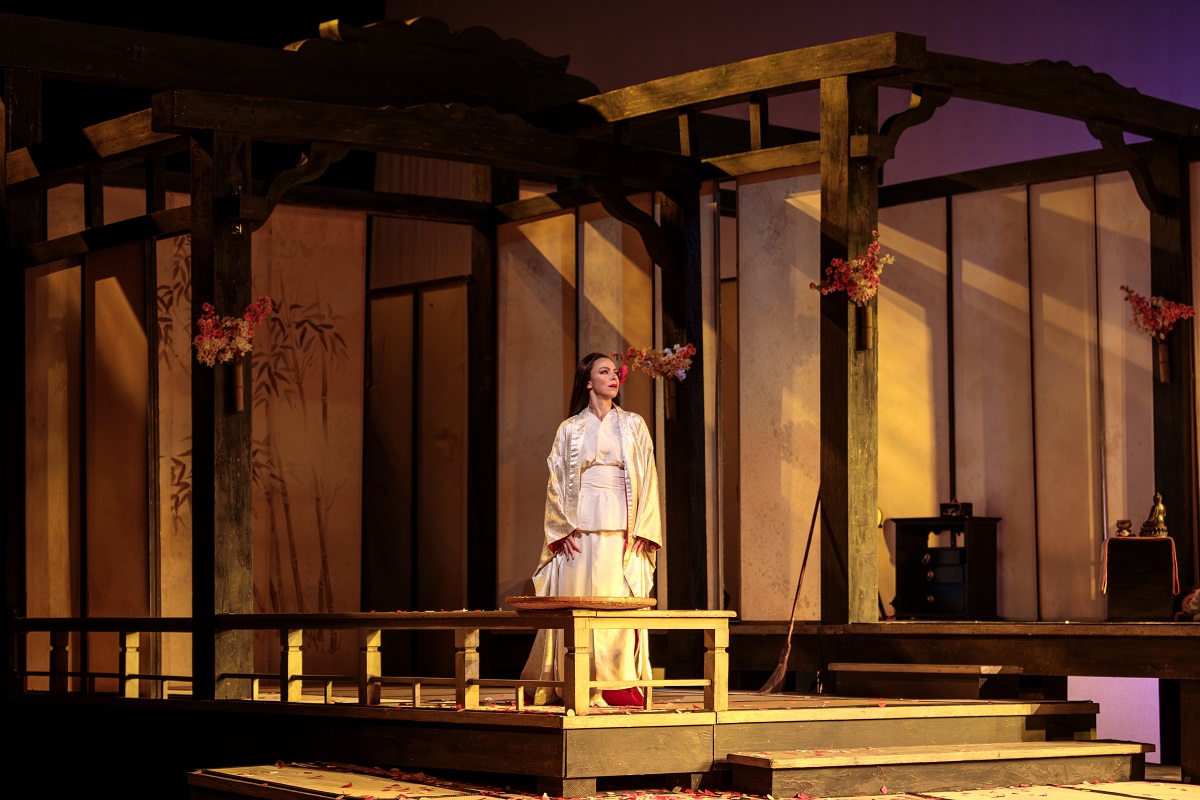Madama Butterfly
By Giacomo Puccini
San Diego Civic Theatre
1100 Third Avenue
San Diego, CA 92101
Friday, April 26, 2024 at 7:30 pm
Sunday, April 28, 2024 at 2:00 pm
Lead Production Sponsors
Darlene Marcos Shiley
Lee and Frank* Goldberg
Production Sponsors
The Estate of James Algert, a true opera lover
Bill and Clarice Perkins
Qualcomm
Stacy and Don Rosenberg
Artist Sponsors
Candace Carroll*, Esq. and Len Simon for soprano Corinne Winters (“Butterfly”)
Mary Ellen Clark for mezzo-soprano Stephanie Doche (“Suzuki”)
Veronica and Miguel Leff for Maestro Yves Abel
Heidi Munzinger and John Shott for tenor Joel Sorensen (“Goro”)
* In memoriam
Puccini’s Madama Butterfly is passionate, poignant and haunting, and features some of the greatest musical moments from the composer’s long career.
Amidst the cherry blossoms of Nagasaki, a young woman makes a stand to support herself as a geisha after her disgraced father takes his life. Fate intervenes and brings her an American Naval Officer and she falls desperately in love. Unaware she is just a distraction to him, she believes they are married and renounces her religion as he sails away promising to return. And he does return, ready to take their child and raise him with his American wife. With her broken heart, she must choose to live with dishonor or die with honor.
These performances star soprano Corinne Winters (last heard as Violetta in 2017’s La traviata) and tenor Adam Smith as Pinkerton in his Company debut. San Diego Opera’s Principal Conductor Yves Abel returns to lead the San Diego Symphony with Jose Maria Condemi directing these performances.
LANGUAGE – Sung in Italian with English and Spanish text projected above the stage
RUN TIME – 2 hours and 30 minutes, including one intermission.
Madama Butterfly In Discussion
In preparation for our upcoming production of Puccini’s Madama Butterfly, San Diego Opera will host a series of online conversations. Click here for more information and to RSVP.
Pre-Opera Talk
The pre-opera talk begins at 6:40 pm before the 7:30 pm Friday evening performance. The Sunday matinee pre-opera talk begins at 1:10 pm before the 2:00 pm curtain.
Mainstage Post-Opera Talk-Back
Stay after the Sunday matinee performance for a Talk-Back. Once the curtain falls, there will be a 10-minute break, then join us in the front of the Dress Circle section where you can ask questions of the stars and cast (subject to availability), and find out what really happened onstage and backstage during the performance!

Corinne Winters
Cio-Cio-San

Corinne Winters
Cio-Cio-San
Soprano Corinne Winters was last seen at San Diego Opera as Violetta in 2017’s La traviata. She has performed over 30 leading roles at major opera houses around the world. Her 23/24 season began as a soloist with the Sun Symphony Orchestra followed by her debut with the Berliner Philharmoniker in Dvořák’s Stabat Mater & a return to the Orchestra dell’Accademia Nazionale di Santa Cecilia for Dvořák’s cantata The Spectre’s Bride. For her debut at the Teatro Real, Corinne reprises the title role in Moniuszko’s Halka in concert. This season also marks her debut at the Wiener Staatsoper as Rusalka, a role she will also debut at Opéra Royal de Wallonie-Liège. Further performances include La Traviata at Lithuanian National Opera & Ballet Theatre, Madama Butterfly at Opéra Nice Côte d’Azur and her debut at Festival d’Aix-en-Provence as both title roles in C.W. Glück’s Iphigénie en Aulide et Iphigénie en Tauride. Future seasons include debuts with Dvořák Prague Festival, Bayerische Staatsoper, Houston Grand Opera, Staatsoper Berlin, & the Metropolitan Opera, among others.

Adam Smith
Lt. Pinkerton

Adam Smith
Lt. Pinkerton
San Diego Opera debut. Hailed as the “tenor that the whole opera world is talking about” (Marie Claire) and a “revelation” (Bachtrack), Adam Smith is known for his voice that “overflows with dramatic conviction and heroic impact” (Opera Now Magazine). Recent standout roles include Don José in Carmen, Rodolfo La Bohème and Cavaradossi in Tosca. Having already made his debuts at the Glyndebourne Festival, Greek National Opera, La Monnaie de Munt and Opéra National de Bordeaux in previous seasons, his 2023/24 season includes two role debuts, and multiple house debuts throughout the United States and Europe.
Adam Smith’s 2023/24 season begins with his role debut as Turiddu in Mascagni’s Cavalleria Rusticana at Lyric Opera of Kansas City conducted by Maestro Roberto Kalb. This is followed by his debut with Washington National Opera, where he sings
Roméo in Gounod’s Roméo et Juliette directed by Simon Godwin. Returning to the role of The Prince in Dvořák’s Rusalka, Adam Smith makes his house debut at Les Arts Valencia in a production by Christof Loy. He later reprises the role of Pinkerton twice more, first in a concert performance with the Stuttgarter Philharmoniker and then again in the summer as he makes his debut at the Festival d’Aix-en-Provence. During his season, he also returns to one of his signature roles, Cavaradossi in Puccini’s Tosca, at the
Staatsoper Hamburg, marking his German debut.
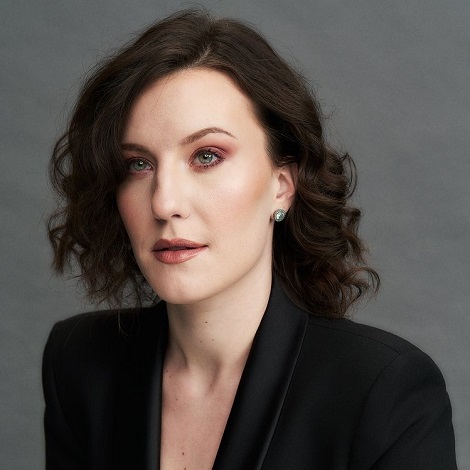
Stephanie Doche
Suzuki

Stephanie Doche
Suzuki
San Diego Opera debut. Starring in leading roles nationwide, mezzo-soprano Stephanie Doche (rhymes with posh), has impressed audiences with her outstanding technical skill and fierce stage presence. In 2023 she performed Rosina in Il barbiere di Siviglia with Florida Grand Opera, Pittsburgh Opera, and Gulfshore Opera, as well as Isabella in L’Italiana in Algeri with St. Petersburg Opera and Piacere in Handel’s Il trionfo del Tempo e del Disinganno with Opera Neo. She was the alto soloist for Palm Beach Symphony Orchestra’s performance of Handel’s Messiah with Gerard Schwarz. Her 2024 performances include Nicklausse in Les contes d’Hoffmann with Opera In Williamsburg and Diana in La Calisto with Opera Memphis. A graduate of the Florida Grand Opera Studio, Stephanie has received awards from the Metropolitan Opera National Council, the D’Angelo Competition, the Orpheus Vocal Competition, the Camille Coloratura Awards, and the SAS Performing Arts Company Vocal Competition.
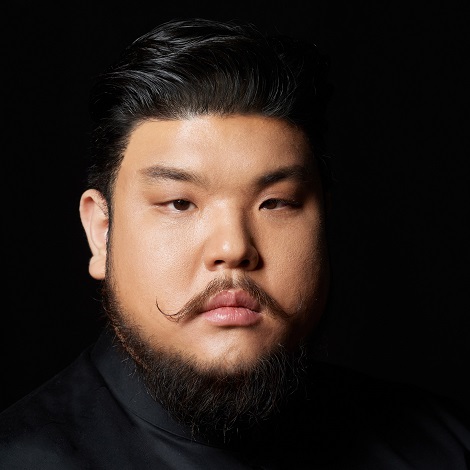
Kidon Choi
Sharpless

Kidon Choi
Sharpless
San Diego Opera debut. Baritone Kidon Choi is a recent graduate of the prestigious Lindemann Young Artist Development Program at The Metropolitan Opera. While in the program he was seen in La fanciulla del West (José Castro) conducted by Marco Armiliato, Otello (Herald) conducted by Gustavo Dudamel, and Madama Butterfly (Prince Yamadori).
Kidon’s 23/24 season includes a return to The Cleveland Orchestra for Die Zauberflöte. Additionally, he will join the roster of the Lyric Opera of Chicago for Aida. On the concert stage, he will appear with the KBS Symphony in Korea for Beethoven Symphony No. 9. In 22/23 he returned to The Korea National Opera for Les Contes d’Hoffmann (Four Villains). Other engagements included his role and company debut with Opera San José for Tosca (Scarpia) and his company debut with San Francisco Opera for Madama Butterfly (Prince Yamadori) and Die Frau ohne Schatten (Night Watchman #2).
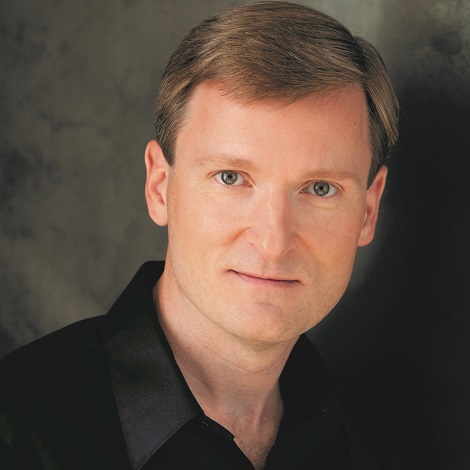
Joel Sorensen
Goro

Joel Sorensen
Goro
American tenor Joel Sorensen made his San Diego Opera debut as Curley in Of Mice and Men in 1999, returning as Camp Williams in Cold Sassy Tree in 2001, Andres in Wozzeck in 2007, Rodriguez in Don Quixote in 2009 and 2014, Tybalt in Romeo and Juliet in 2010, Pang in Turandot and Valzacchi in Der Rosenkavalier in 2011, 2013 as the First Tempter/First Knight in Murder in the Cathedral and Beppe in Pagliacci, Spoletta in 2016’s Tosca, Dr. Caius in Falstaff in 2017, Pong in Turandot in 2018, the Witch in Hansel and Gretel in 2020, and Spoletta in Tosca in 2023.
Most recently, Mr. Sorensen sang Spoletta (Tosca) with San Francisco Opera and Opera San Antonio, Goro (Madama Butterfly) with Nashville Opera and Cedar Rapids Opera Theatre, Beppe (Pagliacci) with Greensboro Opera.
Other recent engagements include: his début with the Bard Music Festival as Bomeliy (The Tsar’s Bride); Pong (Turandot); Spoletta (Tosca) with the Canadian Opera Company; and Pong (Turandot), Incredible (Andrea Chénier), Vítek (Věc Makropulos), and Der Ring des Nibelungen with San Francisco Opera.
As a regular at The Metropolitan Opera, he performed in Madama Butterfly, Tosca, Samson et Dalila, Die Zauberflöte, War and Peace, Der Rosenkavalier, Salome, and Les contes d’Hoffmann.
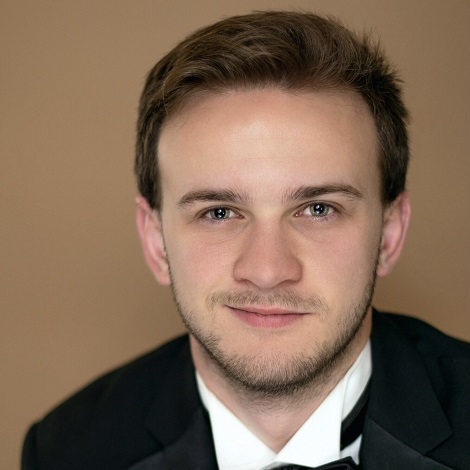
Søren Pedersen
Prince Yamadori

Søren Pedersen
Prince Yamadori
San Diego native, Søren Pedersen (baritone), sang with San Diego Opera last season as a chorus member and soloist in El Último Sueño de Frida y Diego and in the chorus of Tosca. Summer of 2023 saw Søren at the Chautauqua Opera Conservatory led by Marlena Malas where he covered Gianni Schicchi and performed in L’enfant et les sortilèges as l’Horloge and Le Chat Noir. Søren performed as Marcello in his undergraduate’s production of La Bohème conducted
by Bruce Stasyna (2019), and as Don Giovanni (2019) and Gianni Schicchi (2021) in two summer programs in Italy. Søren received his Bachelor’s degree at Point Loma Nazarene University and is finishing his first year as a Master’s of Music student in Vocal Performance at the Cincinnati College Conservatory of Music (CCM). At CCM, Søren performed as Tarqunius in The Rape Lucretia and as Dr. Rappaccini in Catán’s La hija de Rappaccini.

DeAndre Simmons
The Bonze

DeAndre Simmons
The Bonze
American bass, DeAndre Simmons, made his San Diego Opera debut as Sciarrone in 2023’s Tosca. Notable appearances: Amonasro, Aida (Portland Opera in the Park); Oroveso, Norma (NJ Verismo Opera); Padre Guardiano, La Forza del Destino (Atlantic Opera Festival); Alidoro, Cenerentola (Opera Philadelphia); Carbon, Cyrano (Opera Philadelphia); Soloist, Mozart Requiem (Santa Barbara Symphony); soloist, Beethoven Ninth (Santa Barbara Symphony); Boatman, Sunday in the park with George (CCAE Theatricals); soloist, Verdi Requiem (London Symphony); Caiaphas, Jesus Christ Superstar (Moonlight Theatre); soloist, World Childhood Fdn for HM Queens Silvia of Sweden; Recital, Die Winterreise(Chicago, NYC, LA, Berlin, Paris, London); soloist, Handel’s Messiah (Grand Junction Symphony); Ferrando, Il Trovatore (Astoria Music Festival); soloist, Haydn’s The Creation (Bar Choral Society & London Symphony); Grand Inquisitor, Candide (LA Philharmonic); Cal, Regina (Pacific Opera Victoria); Sarastro, Die Zauberflöte (Opera Panama); Recital, (Musée Jacquemart-André, Paris)
IG: @DeAndresVoice

Andrew Konopak
The Imperial Commissioner

Andrew Konopak
The Imperial Commissioner
Baritone Andrew Konopak has become known for his “rich, clarion baritone” (San Diego Story). Most recently, he performed as a soloist in Saint-Saëns: Oratorio de Noël with the San Diego Festival Chorus. When he first moved back to San Diego after receiving his B.M. from CSU Long Beach, he became a San Diego Opera Apprentice Artist. Since then, he has made notable appearances around Southern California and beyond, including Grégorio in Gounod: Roméo et Juliette (San Diego Opera), Barone Douphol in Verdi: La Traviata (FF Collective), All Is Calm (San Diego Opera, Bodhi Tree Concerts, New York City Opera), der Musiklehrer in Strauß: Ariadne auf Naxos (Berlin Opera Academy), Andrew also enjoys concert and recital work with highlights including soloist for Mozart: Regina Coeli (San Diego Festival Chorus), Haydn: Lord Nelson Mass (La Jolla Symphony), Handel: Messiah (San Diego Master Chorale), and Bach: Matthäus-Passion (Artes Vocales of Los Angeles).
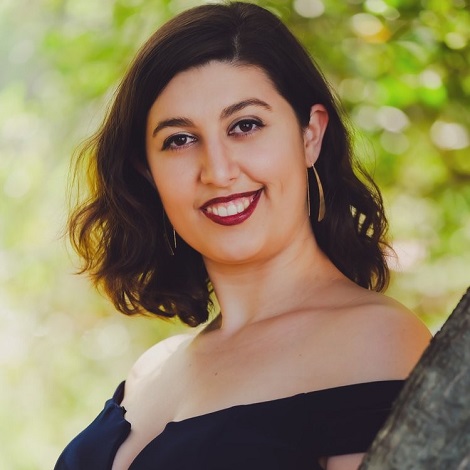
Emily Weinberg
Kate Pinkerton

Emily Weinberg
Kate Pinkerton
Emily Weinberg’s San Diego Opera engagements include roles in Suor Angelica and Tosca.
Hailed for her rich, beautiful voice, mezzo-soprano Emily is an artist to watch. This past year has been an exciting period in her budding career, amassing wins in prestigious competitions, including the Musical Merit Foundation of San Diego, Hawk Vocal Awards, and La Jolla Symphony and Chorus Young Artist Competition. Most recently, Emily was named a winner in the Metropolitan Opera Laffont Competition – San Diego District.
Emily’s recent successes are highlighted by her San Diego Opera debut in Suor Angelica as Lay Sister and the titular role of Carmen with the Pacific Lyric Association. Other roles include Zosia in Jake Heggie’s Two Remain, Dorabella (Cosí fan tutte), L’enfant (L’Enfant et les Sortileges), Miss Todd (The Old Maid and the Thief), and La Badessa (Suor Angelica). Upcoming, Emily will add the role of Toledo in The Falling and the Rising with Bodhi Tree Concerts this May.

James Schindler
The Official Registrar

James Schindler
The Official Registrar
James Schindler – Baritone
Company Work: James has performed in over 20 productions with San Diego Opera since the 2008 season. He sang the role of Spanish Sailor in Moby Dick (2012). Other company work includes Opera San Jose, Pacific Opera Project, Opera Theater Pittsburgh, Pacific Lyric Association, Lyric Opera San Diego, and the Light Opera Company of Salisbury. Mr. Schindler received his training at San Diego State University.

Frank Napolitano
Yakuside

Frank Napolitano
Yakuside
Frank Napolitano studied voice at New England Conservatory under Edward Zambara. His operatic roles include Ferrando (Cosi Fan Tutte), Ottavio (Don Giovanni), Basilio (Le Nozze di Figaro), and Ramiro (La Cenerentola). He started singing with the San Diego Opera Chorus in 2022. In addition to his musical activities, Frank is a Senior Financial Advisor at Sensible Financial Planning and volunteers on the board of Free Flight Exotic Bird Sanctuary in Del Mar.
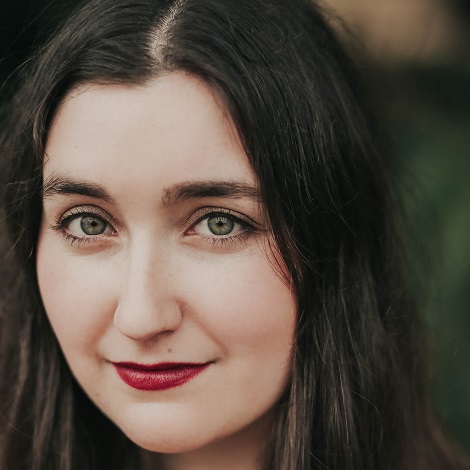
Carly Cummings
Cousin

Carly Cummings
Cousin
Carly Cummings is a San Diego based soprano who has performed in a wide variety of productions throughout the country. Operatic roles include Berta in Il Barbiere di Siviglia with Opera Neo, Magda in Puccini’s La Rondine with Peabody Conservatory, Pamina in Mozart’s Die Zauberflöte with Music on Site, Juliette in Gounod’s Roméo et Juliette with Midwest Institute of Opera. Carly has been a member of the San Diego Opera chorus since the 2022-2023 season. She holds a Master of Music degree from the Peabody Conservatory and a Bachelor of Music degree from San Diego State University. Along with operatic endeavors, Carly is the Artistic Operations Coordinator for the La Jolla Music Society, working with visiting performers year round at The Conrad in La Jolla.
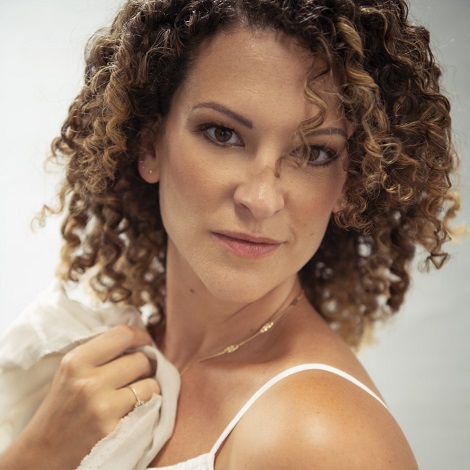
Diana Farrell
Mother

Diana Farrell
Mother
A winner of the 2023 American Prize and 2024 AIMS in Graz Vocal competitions, American lyric spinto soprano, Diana Farrell, has been hailed for her “golden voice.” Her most recent stage performances include the titular role of Puccini’s Tosca, Magda in Menotti’s The Consul, and Verdi’s Lady Macbeth, for which her “passionate intensity…” earned high praise as she “consistently sang with beauty and sensitivity.” In 2023, Ms. Farrell was seen as Tosca with South Coast Symphony and in two productions as Jake Heggie’s Krystyna Zywulska in Two Remain, and made company debuts with Pacific Opera Project and Pacific Symphony. Additional performance highlights include the roles of Rosalinda (Die Fledermaus), Contessa Almaviva (Le nozze di Figaro), Anna Maurrant (Street Scene), and Miriam (Lee Hoiby’s The Scarf), and the title role of Amelia Goes to the Ball. Behind the scenes, Diana has garnered attention for her insightful work as Artistic Director for Lyric Opera of Orange County, which was named Emerging Arts Organization of the Year for 2022 by Arts OC. In 2022 Diana was also named a Women Leader in Orange County Arts, and an OC Visionary by the LA Times. She is librettist and producer for the new opera Gilgamesh from the Assyrian Arts Institute and her libretto from The Yellow Wallpaper will run at Carnegie Hall in 2025.

Mary Boles-Allen
Aunt

Mary Boles-Allen
Aunt
Mezzo-soprano Mary Boles-Allen sang the role of “Sorella Infermiera” in Puccini’s Suor Angelica at San Diego Opera last season. Recently she was the alto soloist in Mozart’s Requiem with the Coronado Philharmonia Orchestra, and sang works by Rachmaninoff and Mendelssohn in concert in Ghent, Belgium. She has performed opera, oratorio and sacred music with Greater San Diego Music Coterie, La Jolla Opera Wednesday, Lyric Opera San Diego, Musica Vitale, San Diego Symphony, and in many churches, including St. Alban’s Cathedral, UK. She is a core chorister at San Diego Opera, and the alto soloist-section leader at La Jolla Presbyterian and at Temple Solel, Encinitas.

Addison Smyres
Trouble/Dolore

Addison Smyres
Trouble/Dolore
Addison is 5 years old and a native of San Diego. She enjoys singing, dancing and being on stage. Most recently she performed in The Nutcracker as a Sugar Plum Candy through San Diego Civic Youth Ballet. When not performing Addison enjoys playing softball, hanging out with her twin brothers, and walking her dog, Bella. She is grateful for the opportunity to perform with the San Diego Opera

Yves Abel
Conductor

Yves Abel
Conductor
Maestro Yves Abel is San Diego Opera’s Principal Conductor. He made his Company debut in 2013 for performances of The Daughter of the Regiment. He returned in 2014 for Pagliacci, in 2016 for Madama Butterfly, in 2019 for Carmen, in 2022 for Roméo et Juliette, the Puccini Duo of Suor Angelica and Gianni Schicchi in 2023 and Don Giovanni earlier this season. He is the Chief Conductor designate of the NordwestDeutsche Philarmonie, Germany. A frequent guest with the world’s great opera companies, Yves Abel has conducted performances at the Royal Opera House, Covent Garden; La Scala, Milan; the Metropolitan Opera, New York; Lyric Opera of Chicago; San Francisco Opera; Seattle Opera; Glyndebourne Festival; Bayerische Staatsoper; Opéra National de Paris; Netherlands Opera; Grand Théatre de Génève; Teatro San Carlo, Naples; Teatro Communale Bologna; New National Theatre, Tokyo; Welsh National Opera and Opera North. He has conducted new productions in Liceo (The Pearl Fishers), Munich (I Capuleti e i Montecchi), Geneva (Les Vêpres Siciliennes), Barcelona (Madama Butterfly), Bilbao (Norma), Toulouse (Lalo’s Le Roi d’Ys and The Tales of Hoffmann), Lisbon (Il Turco in Italia), Naples (Gounod’s Faust), Dallas (Ermione), Seattle (Il trovatore and Heggie’s The End of Affair), Monte Carlo Opera (Il Turco in Italia) and Santa Fe (Così fan tutte), and at the festivals of Pesaro, Caramoor, the Menuhin festival in Gstaad, and the Spoleto festival in Charleston and Spoleto, Italy. As Principal Guest Conductor of the Deutsche Oper, Berlin from 2005 to 2011, he conducted new productions of Don Pasquale, Simon Boccanegra, d’Albert’s Tiefland, and Carmen, as well as performances of The Marriage of Figaro, La traviata, Dialogues des Carmélites, La bohème and Carmina Burana. He is a frequent guest at the Vienna Staatsoper where his repertoire includes The Daughter of the Regiment, The Elixir of Love, Carmen, Madama Butterfly, Simon Boccanegra, A Masked Ball, and L’italiana in Algeri. In concerts he has performed with the Copenhagen Philharmonic Orchestra at the Tivoli Festival, the RTE National Symphony Orchestra, Dublin, the Rotterdam Philharmonic, the Orchèstre du Capitole de Toulouse, the Stavanger Symphony Orchestra, and the Filarmonica Arturo Toscanini in Parma. He has also conducted the Toronto Symphony, Montreal Symphony, Netherlands Philharmonic, San Francisco Symphony, Orchèstre National de Lyon, Orchestra of St. Luke’s New York, the Royal Liverpool, the Haydn Orchestra in Bolzano and the orchestras of Genoa, Naples, and Palermo among others. A Franco-Canadian, he has a particular affinity with the French repertoire and has won significant critical acclaim for his achievements as founder and Music Director of L’Opéra Francais de New York, with whom he has regenerated rare French operas and also performed the world premiere of Dusapin’s To be Sung. Since 1994, the company has performed regularly to capacity audiences at the Lincoln Center. He conducts at various festivals around the world including the Rossini Opera Festival in Pesaro and the Glyndebourne festival, among others. His recordings include Thaïs with Renée Fleming and Werther with Andrea Bocelli (Decca), Madama Butterfly with the Philharmonia Orchestra (Chandos), and two discs of French arias, one with Susan Graham and the City of Birmingham Symphony Orchestra (Erato) and the other with Patricia Petibon and the Orchestra of the Opera National de Lyon (Decca). His most recent recording, ‘Romantique’, is a disc of romantic arias with Elīna Garanča on Deutsche Grammophon. In 2009 he was awarded the title Chevalier de l’Ordre des Arts et des Lettres by the French Government.
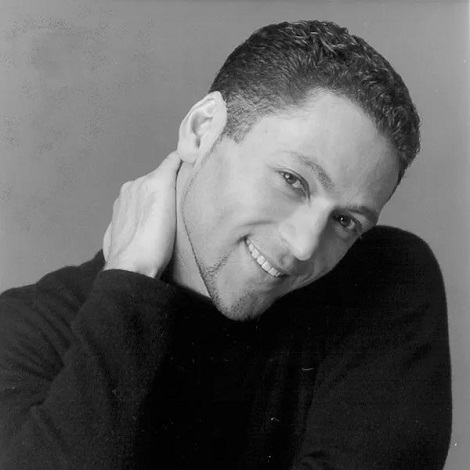
Jose Maria Condemi
Director

Jose Maria Condemi
Director
San Diego Opera debut. Jose Maria Condemi is a director, producer, and educator in the field of opera and theater, whose work has been consistently praised for its strong conceptual approach, striking visual presentation, and remarkable dramatic truth.
Mr. Condemi’s longtime association with the San Francisco Opera has resulted in several mainstage directing engagements, including Carmen, Un Ballo in Maschera, Madama Butterfly, Faust, Tosca and Così fan Tutte. He also helmed the San Francisco Opera’s world premiere commissions of The Secret Garden and Earthrise and innovative outreach projects such as La Bohème Out of the Box.
Other noteworthy directing engagements elsewhere include Ernani and Tristan und Isolde (Lyric Opera Chicago), Aida (Houston Grand Opera), Tosca (The Dallas Opera), Luisa Miller (Canadian Opera Company), Orphee et Eurydice, La Bohème, Tosca and Il Trovatore (Seattle Opera), Ainadamar, Don Giovanni, La Traviata, Tosca and Lucia di Lammermoor (Cincinnati Opera), Don Giovanni (Portland Opera), Cosi fan tutte and Il Barbiere di Siviglia (Atlanta Opera), Cendrillon, Joan of Arc and Rigoletto (New Orleans Opera), The Elixir of Love (Opera Theatre of Saint Louis), Maria Padilla (Minnesota Opera), Florencia en el Amazonas (Opera Colorado, Utah Opera, Pittsburgh Opera), Simone Boccanegra (Teatro Colon/Buenos Aires), Il Trovatore (Austin Lyric Opera),Tosca and Maria de Buenos Aires (Florida Grand Opera), Frida (The Detroit Opera, Atlanta Opera and Florida Grand Opera).
Condemi’s theater and musical theater directing credits include Caryl Churchill’s Mad Forest, Dürrenmatt’s The Physicists, Dorfman’s Death and the Maiden, Lorca’s The House of Bernarda Alba, Hermann’s Hello Dolly, among others.
Mr. Condemi is also in demand as a trainer of young artists and has been a master teacher and director for the San Francisco Opera Center, Seattle Opera Young Artists Program, Houston Grand Opera Studio, University of Cincinnati, Opera Theater of Lucca and the New National Theater Young Artists Programme in Tokyo.
Condemi was the Artistic Director of Opera Santa Barbara (2010-2015), and the Carol Franc Buck Distinguished Chair at the San Francisco Conservatory of Music (2015-2022)
Originally from Argentina, Mr. Condemi received an undergraduate degree in Opera Stage Direction at the Teatro Colón/Buenos Aires and completed a Master of Fine Arts in Directing at the University of Cincinnati College-Conservatory of Music. He was a member of the Merola Opera Program, a first-time Adler Fellow in Stage Direction at the San Francisco Opera and Fulbright Fellow.
Upcoming engagements include Eugene Onegin (as both director and scenic designer, Indiana University/Jacobs School of Music), Corpus Evita (as dramaturg, West Bay Opera), a revival of his La Bohème Out of the Box for San Francisco Opera and a yet-to-be-announced title with Cincinnati Opera.
Synopsis in English
MADAMA BUTTERFLY synopsis
Act I
In the American Consulate in Nagasaki, Goro, a marriage broker, explains the features of a local home to the U.S. Navy Lieutenant B.F. Pinkerton, who recently leased the place for 999 years, with the option to cancel the contract with a month’s notice. As part of the deal, Pinkerton receives three servants and takes a geisha wife known as Madama Butterfly (Cio-Cio-San). The American Consul, Sharpless, arrives and Pinkerton explains his philosophy of life—a navy man’s life of pleasure, roaming the seas in search of adventure with a girl in every port. Sharpless cautions the officer that Cio-Cio-San may not take their wedding vows as lightly as he. Pinkerton dismisses the Consul’s warnings and toasts the day he takes a “real” American wife. Cio-Cio-San arrives and explains to Sharpless and Pinkerton that her family was once wealthy, but lost their status. Goro tells them that her father committed suicide on the instructions of the Mikado. Naively but with no shame, she informs the men she became a geisha to stay alive. Cio-Cio-San shows her future husband her meager belongings and humbly declares that, as the ultimate sign of her love, she has converted to the Christian faith. The wedding is brief, more like a business deal. The post-wedding celebration is interrupted by the arrival of the Bonze, Cio-Cio-San’s uncle, a Buddhist priest who berates the young girl for betraying her people and her religion. Pinkerton angrily orders the Bonze and the other guests away and turns to his new wife to console her, drying her tears as night falls.
Act II
Three years have passed since Pinkerton left Nagasaki, and Cio-Cio-San pines for his return. Realizing they have little money left, Suzuki prays to the gods for aid and warns Cio-Cio-San that unless her husband returns, there’ll be nothing but trouble. Cio-Cio-San scolds Suzuki for her lack of faith and confidently predicts that one fine day his ship will appear on the horizon. Sharpless arrives with the intention of reading to her a recent letter from Pinkerton. Starved for company and brimming with questions, Cio-Cio-San doesn’t allow Sharpless to read the letter. His task is further frustrated by Goro, who hovers outside with the Prince Yamadori, the latest in a long line of suitors hoping for the young woman’s hand. Cio-Cio-San scoffs at Yamadori’s offer and dismisses him and Goro. Once they are gone, Sharpless finally resumes reading the letter to Cio-Cio-San, who excitedly interrupts at the end of every hopeful sentence. Unable to cope with her reactions, Sharpless puts the letter away and bluntly asks her what she would do if Pinkerton never returned. Slowly realizing what Sharpless means, Cio-Cio-San rushes out of the room, returning with Pinkerton’s child. She insists Sharpless tell Pinkerton about the boy, optimistic he will return once he knows about his baby. Sharpless, distraught over Cio-Cio-San’s condition, leaves with a promise to pass along her message. A cannon shot is heard from the harbor. Cio-Cio-San sees Pinkerton’s ship. Excitedly, she and Suzuki strew flowers everywhere. Cio-Cio-San changes into her wedding gown and obi so that Pinkerton will see her the way she was on that memorable day. The family waits.
Act III
As dawn breaks, Suzuki awakens. Pinkerton has not come to the house. Suzuki insists that Cio-Cio-San get some rest, promising to stir her if Pinkerton arrives. Suzuki is startled by the arrival of Sharpless with Pinkerton. An unknown woman waits outside. Suzuki insists on knowing who she is. Pinkerton cannot bring himself to answer. Finally Sharpless responds: she is Pinkerton’s wife, Kate. Sharpless begs the distraught Suzuki to ask Cio-Cio-San to give up the child so that he might be taken to America. Overcome by guilt, Pinkerton cannot face his Japanese wife and flees the home. Cio-Cio-San breathlessly enters, sensing her husband has arrived. Searching every corner, she cannot find Pinkerton but sees Kate. Instinctively, she knows this woman is Pinkerton’s wife. Cio-Cio-San agrees to surrender her child, but only if Pinkerton himself comes to pick him up. Ordering Suzuki away, Cio-Cio-San picks up the dagger her father used to commit suicide and reads the inscription on the blade: “Let him die with honor who can no longer live with honor.”
Sinopsis en Español
MADAME BUTTERFLY sinopsis
Act I
En el Consulado Norteamericano de Nagasaki, Goro, un intermediario matrimonial, le explica a el teniente de la Marina Norteamericana B. F. Pinkerton, las características de una casa local, ya que él acaba de rentar el lugar por 999 años, aunque tiene la opción de cancelar el contrato dando aviso un mes antes. Como parte del trato, Pinkerton recibe tres sirvientes y toma a una geisha conocida como Madame Butterfly como esposa (Cio-Cio-San). El Cónsul Norteamericano, Sharpless llega y Pinkerton le comparte su filosofía de la vida –la vida de un marino llena de placer, deambulando por los mares en busca de aventuras con una novia en cada puerto. Sharpless le advierte al oficial que Cio-Cio-San no tomará las promesas nupciales tan a la ligera como él. Pinkerton no le hace caso a las advertencias del Cónsul y brinda por el día en que se case con una esposa “real” norteamericana. Cio-Cio-San llega y le explica a Sharpless y a Pinkerton que su familia fue adinerada hace algún tiempo, pero perdieron su estatus social. Goro les dice que su papá se suicidó porque así se lo instruyó el Mikado. Inocentemente pero sin avergonzarse ella les informa a los dos que entonces se volvió geisha para poder sobrevivir. Cio-Cio-San le muestra a su futuro esposo sus escasas pertenencias y humildemente le dice que cómo su mayor prueba de amor, ella se ha convertido a la fe cristiana. La boda es breve, más como si fuera un negocio. Después de la boda, la celebración se ve interrumpida por la llegada de Bonze, el tío de Cio-Cio-San, un sacerdote budista quien regaña a la joven por haber traicionado a su gente y a su religión. Pinkerton enojado ordena que se vayan Bonze y los otros invitados y regresa a consolar a su nueva esposa, limpiando sus lágrimas mientras cae la noche.
Act II
Ya han pasado tres años desde que Pinkerton dejo Nagasaki, y Cio-Cio-San anhela su regreso. Se da cuenta de que les queda poco dinero. Suzuki les reza a los dioses para que las ayuden, pero le advierte a Cio-Cio-San que si no regresa su esposo, no tendrán otra cosa más que problemas. Cio-Cio-San regaña a Suzuki por su falta de fe y pronostica que un buen día su barco aparecerá en el horizonte. Sharpless llega con la intensión de leerle a Cio-Cio-San una carta reciente de Pinkerton. Deseosa de compañía y llena de preguntas, Cio-Cio-San no le permite a Sharpless leer la carta. Su intensión se ve frustrada aún más por Goro, quien merodea afuera de la casa con el príncipe Yamadori, el último de la enorme lista de pretendientes que esperan poder obtener la mano de la joven. Cio-Cio-San se burla de la oferta de Yamadori y los echa a él y a Goro. Una vez que se han ido, Sharpless finalmente continua leyendo la carta a Cio-Cio-San, quien con gran excitación lo interrumpe al final de cada frase de esperanza. Sin poder aguantar sus reacciones, Sharpless deja la carta y abiertamente le pregunta lo qué haría si Pinkerton nunca regresara. Lentamente dándose cuenta de lo que le quiere decir Sharpless, Cio-Cio-San deja la habitación, y regresa con el hijo de Pinkerton. Ella le insiste a Sharpless que le diga a Pinkerton acerca del niño, optimista él regresará cucando sepa de su hijo. Sharpless consternado acerca de la condición de Cio-Cio-San parte con la promesa de pasarle su mensaje a Pinkerton. El trueno de un cañón se escucha en el puerto. Cio-Cio-San ve el barco de Pinkerton. Feliz ella y Suzuki colocan flores por todas partes. Cio-Cio-San se cambia y se pone su vestido de bodas y su (obi) cinturón japones, para que Pinkerton la vea como estaba en aquel día memorable. La familia lo espera.
Act III
Al amanecer Suzuki despierta. Pinkerton no ha venido a la casa. Suzuki le insiste a Cio-Cio-San que descanse un poco, prometiendo despertarla si Pinkerton llega. Suzuki es sorprendida por la llegada de Sharpless con Pinkerton. Una mujer desconocida espera afuera. Suzuki insiste en saber quién es la mujer. Pinkerton no le puede responder. Finalmente Sharpless responde: ella es la esposa de Pinkerton, Kate. Sharpless le suplica a la desconsolada Suzuki que le pida a Cio-Cio-San qué les de al niño para que se lo lleven a América. Agobiado por la culpa, Pinkerton no puede enfrentarse a su esposa japonesa y huye de la casa. Cio-Cio-San sin aliento entra, sintiendo que su esposo ha llegado. Buscando en cada rincón, ella no puede encontrar a Pinkerton pero ve a Kate. Instintivamente, ella sabe que esta mujer es la esposa de Pinkerton. Cio-Cio-San está de acuerdo en darles al niño, pero sólo si Pinkerton mismo viene por él. Ella le pide a Suzuki que se vaya, Cio-Cio-San toma la daga que su padre utilizó para suicidarse y lee la inscripción en el filo: “Deja que muera con honor aquel que no puede vivir con honor”.
Corporate Sponsors















